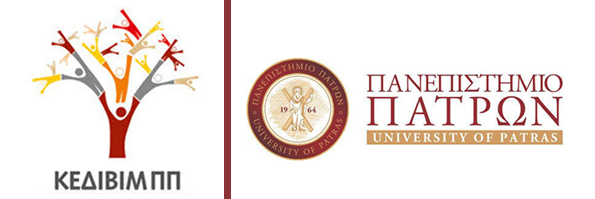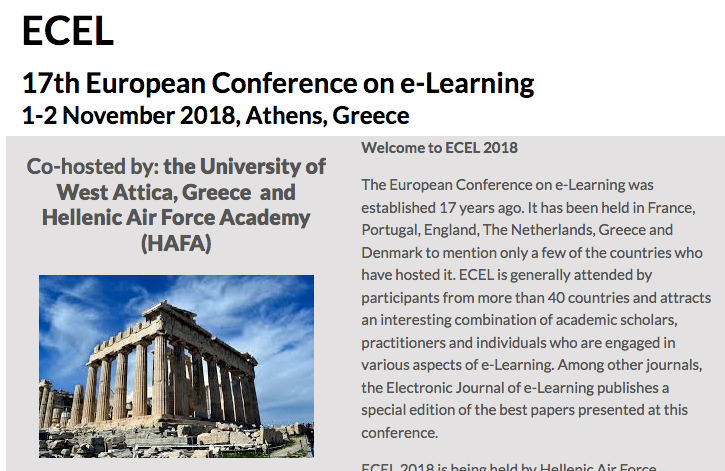Επιστημονική Εργασία του ΚΕΔΙΒΙΜ ΠΠ για την Ποιότητα στην Εξ Αποστάσεως Εκπαίδευση εγκρίθηκε και θα παρουσιαστεί στο 17ο Ευρωπαϊκό Συνέδριο E-Learning
Ερευνητική ομάδα του Κέντρου Επιμόρφωσης και Διά Βίου Μάθησης Πανεπιστημίου Πατρών (ΚΕΔΙΒΙΜ ΠΠ) συνέταξε επιστημονική εργασία με τίτλο «Towards a Blended Strategy for Quality Distance Education Life-Long Learning Courses – The Patras Model» η οποία εγκρίθηκε για παρουσίαση και δημοσίευση στα πρακτικά του συνεδρίου 17th European Conference on e-Learning. Την εργασία θα παρουσιάσει ο κ. Στέλιος Μυστακίδης.
Στην εργασία περιγράφονται πτυχές ενός προτεινόμενου μοντέλου ποιότητας για τον σχεδιασμό, την ανάπτυξη και την υλοποίηση προγραμμάτων διά βίου μάθησης με τη μέθοδο της εξ αποστάσεως εκπαίδευσης και της μεικτής μάθησης με βάση την εμπειρία από την υλοποίηση σχετικών δράσεων στο ΚΕΔΙΒΙΜ ΠΠ. Επίσης παρουσιάζονται αποτελέσματα έρευνας για την ποιότητα της εκπαίδευσης και μάθησης σύμφωνα με τις αξιολογήσεις συμμετεχόντων σε προγράμματα του ΚΕΔΙΒΙΜ ΠΠ, καθώς και άλλων φορέων.
Το ΚΕΔΙΒΙΜ αναπτύσσει το E-Learning του Πανεπιστημίου Πατρών για την παροχή ποιοτικών προγραμμάτων εξ αποστάσεως εκπαίδευσης που τυγχάνουν σημαντικής απήχησης και υλοποιούνται με επιτυχία σε όλη την Ελλάδα.
Ακολουθούν η βιβλιογραφική αναφορά (APA) της εργασίας, καθώς και η περίληψή της στα αγγλικά.
Mystakidis, S., Berki, E., Valtanen, J., & Amanatides, E. (2018). Towards a Blended Strategy for Quality Distance Education Life-Long Learning Courses – The Patras Model. In Proceedings of the 17th European Conference on e-Learning, ECEL 2018. Athens, Greece.
Abstract: The utilization of Technology Enhanced Learning and more specifically of Distance Education for Life-Long Learning and Continuous Professional Development are at the epicenter/focus of European policies for the improvement of the delivery of Vocational Education and Training. In this context, one of the important challenges is the design of versatile quality assurance strategies for training; providers that can guide the development of eLearning programs that achieve real impact in the participants’ lives. The University of Patras has launched a project for the provision of short, accessible, certified distance life-long learning programmes. The main pillars of this project are Excellence, Specialized Personalized Training at cutting edge subjects, Quality, Deep Learning and Innovation. Quality is perceived as a vibrant, dynamic process that is evaluated in the eye of the beholder (learner). Deep Learning goes beyond (superficial) knowledge increase: it aims at the development of transformative knowledge, meaning and metacognitive skills. In this study we identify, propose and evaluate preconditions, criteria and strategies to achieve high quality blended learning online courses based on the relevant experience of the University of Patras’ Educational Centre for Life-Long Learning (KEDIVIM). We present the methods used to assess the quality of the eLearning programmes, key findings of the evaluation process as well as early results of a research study on the quality of learning. The formative evaluation process was conducted by external assessors based on Context, Input, Process, Product approach. The evaluation instruments were online questionnaires, structured and semi-structured observation. The research study on quality was conducted by using an online questionnaire and aims at estimating the level of participants satisfaction using interactive learning methods such as collaborative learning. Early results of the study suggest that the project lead to the rapid provision of eLearning programmes that used successfully active learning methods to achieve high learner satisfaction and address training needs and skills gaps.







